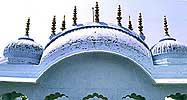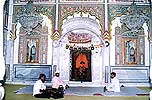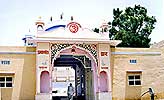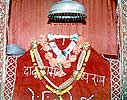| |
|
|
|
 Cause
of Establishment:The
Dadu sect is a worshipper of God whom they hold to be formless,
untainted and Existence-Consciousness-Bliss (Sat-Chit-Anand). The
founder of the sect Shri Dadu Dayal Maharaj is believed to be an
incarnation of Sanat Kumar, the mind born son of Lord Brahma,
the creater Born in Gujrat, in the city of Ahmedabad in 1544
A.D. There are controversies regarding his caste but they are of
little importance. In his childhood at 11, he came into contact
with an old sage Vriddhanand whom the followers of this sect
hold to be God himself. Dadu received the divine message from
his guru and became accomplished. He worshipped Niranjana
Parabrahma (the in tainted Absolute Brahma). He gave up his
family and came to Rajasthan. Cause
of Establishment:The
Dadu sect is a worshipper of God whom they hold to be formless,
untainted and Existence-Consciousness-Bliss (Sat-Chit-Anand). The
founder of the sect Shri Dadu Dayal Maharaj is believed to be an
incarnation of Sanat Kumar, the mind born son of Lord Brahma,
the creater Born in Gujrat, in the city of Ahmedabad in 1544
A.D. There are controversies regarding his caste but they are of
little importance. In his childhood at 11, he came into contact
with an old sage Vriddhanand whom the followers of this sect
hold to be God himself. Dadu received the divine message from
his guru and became accomplished. He worshipped Niranjana
Parabrahma (the in tainted Absolute Brahma). He gave up his
family and came to Rajasthan.
|
|
|
|
|
|
|
At Sambhar he established Brahma Sampradaya
which was later named Parabrahma Sampradaya and then renamed
Dadu Panth. He is said to have met Akbar in Amer in about 1586
A.D. He also traveled far and wide to Delhi, Kashi, Bihar,
Bengal and Gujrat. Dadu's language evidences a mixture of
Sindhi, Gujrati and Marwadi. He had 152 disciples of which 52
are said to be the pillars of this Panth. Dadu breathed his last
at Naraina near Sambhar in 1603 A.D. This place became the Dadu
Dwara. Dadu's Hair, his Tumba (Gourd used as water container),
Chola (attire) and Khadau (Sandals) have been preserved here.
Naraina was last phase of Dadu's ascetic life. Dadu's utterances
are collected in the famous book "Anabhai Vani" a
collection of his verses and padas. His second book is "Kayabeli".
The origin of Dadu's utterances is the natural life of man.
Every word of his makes a direct appeal to the
reader's/listener's heart. He holds a unique place amongst the
poets and philosophers who hold abstract form of God as the real
one. Since this was the place where Saint Dadu Dayal breathed
his last after years of asceticism, a Dwara (Temple) has been
built here. This is known as Guru Dham (abode of guru) and
principal seat of the Acharya of Dadu sect.
|
|
| Brief
of the Diety: |
|
 The statue is made of Stone.
The statue is made of Stone.
|
| Religious
sect to which the temple belongs: |
|
Dadu
Sampraday
|
| Architecture
of the Temple: |
| Important
Architectural Characteristics: |
|
 Dadu temple, the twelve doored palace of the Acharya,
the Dadu temple, the twelve doored palace of the Acharya,
the  palanquin of Bai Ji, Barahdari (twelve doored hall)
of Jait Sahab, Chowk for horses, Khejaraji Dham,
entombments and canopies- these are samples of
architecture. palanquin of Bai Ji, Barahdari (twelve doored hall)
of Jait Sahab, Chowk for horses, Khejaraji Dham,
entombments and canopies- these are samples of
architecture.
|
|
|
|
| Material
of Construction: |
Lime
mortar, Sand & Marble
|
| Total
Construction Time: |
6
years |
|
| Religious
aspects of temple: |
|
Dadu
Dwara, Naraina is the principal seat of the sect's
Acharya. This is a sacred place of asceticism and
religious discourses, education center etc.
|
| Unique
features of the temple: |
|
 In this Naraina dham there are entombments of Acharyas
and Mahantas. A big chunk of land measuring 101 Bighas
make the dwara a rich center of spiritual and worldly
progress. The Dham was the respected place for the Royal
family of Jaipur which held it as Gurudwara.
In this Naraina dham there are entombments of Acharyas
and Mahantas. A big chunk of land measuring 101 Bighas
make the dwara a rich center of spiritual and worldly
progress. The Dham was the respected place for the Royal
family of Jaipur which held it as Gurudwara.
|
| Festivals
& Fairs in Temple (Main Events): |
|
Anniversaries
of great Saints and sages festivals held sacred, service
camps for saints, guests, people and other functions.
|
|
| Timings: |
| Morning
Time: |
7.00
am to 11.00 am |
Evening
Time:
|
5.00
pm to 9.00 pm |
| Custom
& Traditions of Temple: |
|
Dadu
Sampradaya has well defined social code. The Acharya is
succeeded by his principal disciple. There are two kinds
of Sadhus in Dadu sect viz; Nihang and Householders.
|
| Details
of Temple: |
| Vandana
(If any particular) in text: |
| Issues
requiring global attention for conservation, protection
and improvement of the temple: |
|

|
|
|
|
Contact
Us | Help Us
|
|
Copyright
© 2001-2002 Deptt. of Devasthan, Govt of Rajasthan, Jaipur
|
|

